#Is hijab compulsory in Islam
Explore tagged Tumblr posts
Text
leftists oppression olympicsing their way into defending islam gotta be one of the funniest online phenomenons
#like what are we doin here yall#religion#islam#defending compulsory hijab because 'it uplifts women' 🤦#i would love to read more deconstruction critiques of islam#but between the right's anti arab insanity and the left's calling anything islamophobic that aint happening LOL
1 note
·
View note
Text
Is the hijab a choice?
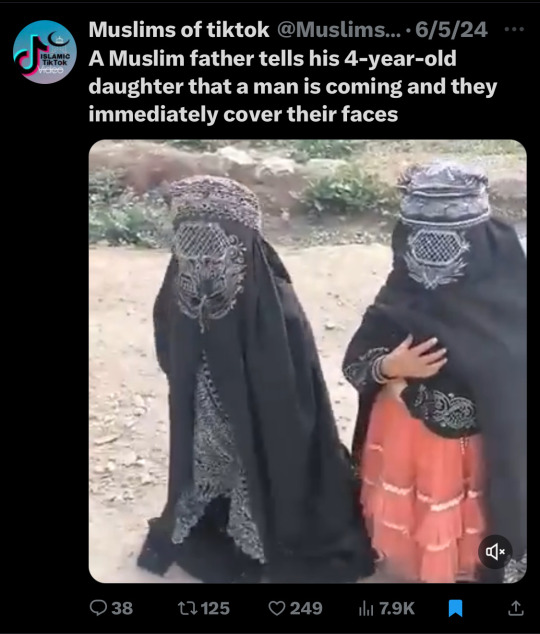
In the 4 madhabs, or schools of Islamic thought, there is often disagreements on Islamic rulings. There is no disagreements on the women’s awrah though.
The “awrah” is the shameful part of the body that must be hidden from public view. There is different rules for what can be shown to family members, non Muslim women, or strange men. The ruling for the public view of a woman’s body is that she must cover all except her face and hands.
To make matters worse, covering the awrah is Fardh. Fardh means compulsory. If you do not follow a compulsory command of Allah, and it is not forgiven before the day of judgment, you go to hell. Now whether or not you stay in hell forever there is disagreement on, but it begs the question:
Is hijab a choice? How can it be a choice when the threat of hell is looming over a girl, and conditioned into her for her entire life?
Muslimahs are coerced into wearing the hijab, and it is a clearly misogynistic and patriarchal expectation of women that must be abolished.
298 notes
·
View notes
Text
Sepideh Qolian, a 30-year-old Iranian labor activist, spent two years in Tehran’s Evin Prison, where she wrote two books, one of them a celebrated prison memoir in the form of a baking cookbook. Just last week, Qolian was released—and three days later, Israeli missiles and drones began striking targets inside Iran.
Israeli Prime Minister Benjamin Netanyahu has addressed the Iranian people, telling them that his war can help them free themselves from their oppressive government. “This is your opportunity to stand up,” he said. Curious how Iranian opposition activists were responding to this message, I called Qolian.
“I know that war won’t bring democracy,” she told me. She was active in the Women, Life, Freedom movement against compulsory veiling in 2022–23, and she told me that Netanyahu is no champion of the movement’s values. “The life that we wanted is the mirror opposite of the terrible events that are now happening,” she said. But the war hadn’t endeared Iran’s leadership to her, either—she blames its aggressive policies for the country’s predicament.
That Iran has a substantial population opposed to its system of government is well known and has been oft-proved through cycles of protest and repression. The Women, Life, Freedom movement was one dramatic iteration. It followed economically motivated protests in 2017–19, the sweeping pro-democracy Green Movement in 2009–10, a student uprising in 1999, and an electorally based movement for reform covering nearly all the years since 1997. Iranians have been outspoken inside the country and across an ever-growing diaspora against the Islamic Republic’s human-rights abuses, constriction of personal freedoms, economic mismanagement, and belligerent foreign policy.
For years, the debate outside Iran was theoretical: Would a military strike on the country help its people topple a hated regime, or would it cause even oppositionists to rally ’round the flag in their nation’s defense? Now the answer to this question is being determined by the hour, and it is neither binary nor simple. Even ardent anti-regime activists I spoke with were hard-pressed to support Israeli attacks that have already killed almost 200 civilians, according to Iran’s health ministry. Some had cheered the killings of certain repressive military figures in the early hours of the strikes, but the mood has since turned to terror, the priority simple survival.
Tehran is a dense city of 9.8 million. As Israel strikes targets across the Iranian capital as well as in other cities, it hits civil-society figures associated with the country’s protest movement alongside officials and nuclear scientists. Parnia Abbasi, 23, a poet and an English teacher, was killed together with her parents and brother on the first day of the air campaign; the target of the strike that killed them was a regime official in a nearby building. Zahra Shams, 35, was a devout Muslim who wore the hijab by choice but vocally opposed its enforcement on others, even tweeting in support of the anti-hijab protests in 2022. She was killed in a strike intended for a regime official who lived in her apartment building.
Most of the activists I spoke with—about a dozen—blamed the war largely on Supreme Leader Ali Khamenei and evinced no political support for his regime. Nor were they supportive of Iran’s attacks on Israel, which have already killed at least 23 Israeli civilians, injured hundreds more, and sent thousands of people to bomb shelters every night. But they in no way welcomed the Israeli strikes on their country. They worried about their own safety—and also about societal collapse and the destruction of Iran’s infrastructure.
“I oppose the Islamic Republic and Khamenei with all my being,” a 24-year-old activist, who asked that I withhold her name out of concern for her safety, told me from Tehran. “I took part in many demonstrations during the Women, Life, Freedom movement. But now I can’t even think about the regime or overthrowing it. I am scared. I am worried. I fear for the life of myself and everyone around me.”
A 26-year-old activist who was arrested during the 2022–23 protests told me that she was emphatically opposed to the Israeli strikes. “The war goes beyond the regime,” she said in a phone call. “It has massive negative consequences for our country. It is destroying the economy. It can lead to hunger, shortage of medicine, cutting connections with abroad. It is a total disaster. It is killing innocent people in both Israel and Iran.”
One young activist was busy trying to escape the capital with her elderly and sick mother when I called. They were heading north, to the coast of Caspian Sea, an area thought to be safer from attacks. “I can’t think about activism under the sound of drones and missiles, can I?” she asked me rhetorically. “I don’t support the targeting of civilians anywhere, whether in Iran or Israel.”
Alireza Ghadimi, a sociology student and activist at the University of Tehran, was still in his dorm when I caught up with him. His campus has a long history as an epicenter of protest, both against the Shah during the revolution and against the Islamic Republic, which crushed student protests there in 1999. “I carry this history with me,” Ghadimi said, “and it now feels terrifyingly alive.” He described the sounds of explosions, the shaking of walls, frightened voices outside. “I am one of many young Iranians who want change,” he said. “But this war is not helping us. It is destroying us. It is silencing the very people it claims to save.”
Prominent figures in Iran’s movement for democracy have also come out against both the war and the regime. From his prison cell in Evin, former Deputy Interior Minister Mostafa Tajzadeh condemned the Israeli attacks and called for an immediate cease-fire. But he also called for “a peaceful transition to democracy” in Iran. The Nobel peace laureates Shirin Ebadi and Narges Mohammadi were joined by five other activists (including the director Jafar Panahi, who last month won the Palme d’Or at the Cannes Film Festival) in issuing a call for an immediate end to the war and condemning the attacks on civilians by both Iran and Israel. They also called for an end to Iran’s enrichment of uranium and for a democratic transition.
The Islamic Republic has decades of protest movements and crackdowns behind it, and with those, a globe-spanning diaspora of opposition exiles. Most of the people I spoke with were of a fairly like mind with their counterparts inside Iran. A young activist in Europe, who asked that I withhold her name because she frequently visits Iran, told me that she understood the glee that greeted the first killings of regime military figures. Still, she said, “anybody who’s seen what Israel has done in Gaza, Lebanon, and even Syria recently would know that Netanyahu is not seeking stability in the region. He is hitting Iran’s refineries and power stations, so he is clearly not thinking about our people.”
For a more seasoned opinion, I spoke with one of my political heroes, the 80-year-old human-rights lawyer Mehrangiz Kar. She helped organize the fight against the mandatory hijab right at the Islamic Republic’s inception in 1979 and has been a voice for democracy and the rule of law ever since. She was hounded out of Iran about 20 years ago and now lives in Washington, D.C.
“When I see the Israeli strikes on Iran today, I feel like I am seeing the burning of my very own house,” she told me. “They are targeting my homeland. This isn’t acceptable, no matter who is doing the attacks. No such attack is acceptable under international law.”
Kar told me she blames Khamenei for having made an enemy out of Israel for decades. But she made clear that Netanyahu is no friend to Iran’s freedom fighters. “Nobody I spoke to in Iran supports these attacks,” she said. “People are angry, and they hate the Islamic Republic. But they now probably hate Mr. Netanyahu and his military policies even more.”
Israel’s campaign could yet rattle the Iranian regime into some kind of change in behavior or composition. But the notion that air strikes will lead to a popular uprising, or that Iranian activists for freedom will support a devastating war on their homeland, appears to be little more than a fantasy.
21 notes
·
View notes
Text
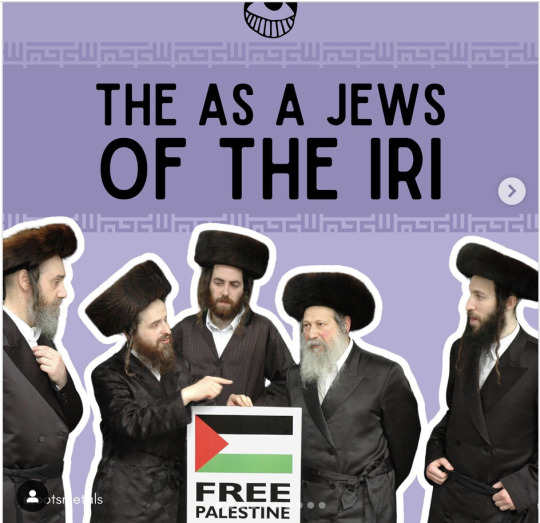
the As a Jews of the IRI
NOVEMBER 25, 2024
WHAT IS AN "AS A JEW"?
“As a Jew” is a tongue-in-cheek term Jews use to describe fellow Jews who weaponize their Jewish identities to excuse, minimize, justify, or deny antisemitism.
As in, “As a Jew, this is not antisemitic because so and so…”
WHAT IS THE ISLAMIC REPUBLIC?
The Islamic Republic is the fundamentalist Islamist, ultra-conservative, warmongering regime that has been ruling Iran -- and oppressing its population -- with an iron fist since the 1979 Iranian Revolution. Many Iranians call the Islamic Regime an “occupying force” because it is culturally foreign to Iran.
According to Iranian-American policy analyst Karim Sadjapour, the three ideological pillars of the Iranian regime are “compulsory hijab, death to America, and death to Israel.”
After the Islamic Republic came into power, over 80% of Iran’s ancient Jewish population fled the country. Today, the 8,500 Jews still living in Iran are subject to second-class citizenship and are constantly under the suspicion of the regime, for which they must tread carefully, never openly criticizing the regime’s implementation of Sharia Law.
THE ISLAMIC REPUBLIC IS A GENOCIDAL THREAT TO JEWS
Given the Islamic Republic’s commitment to the “destruction of Israel” -- where around half of the world’s Jews live -- it has spent decades establishing proxy terrorist militias around the Jewish state. Among the Islamic Republic’s proxies are Hamas, Palestinian Islamic Jihad, Ansar Allah, and its most important proxy, Hezbollah.
But the Islamic Republic’s targeting of Jews extends far, far beyond the Jewish state. In other words, no, the Islamic Republic isn’t merely “anti-Zionist.”
The Islamic Republic has planned and carried out terrorist attacks and massacres of Jews everywhere from Thailand to Kenya.
The Islamic Republic’s deadliest attack on Jews in the Diaspora was the 1994 bombing of the Asociación Mutual Israelita Argentina (AMIA), a Jewish community center in Buenos Aires, Argentina, which took 85 innocent lives. Before the October 7 Hamas massacre, which killed 1,200 Israelis, predominantly civilians -- another attack that was planned and funded by the Islamic Republic -- the AMIA bombing was the largest massacre of Jews since the Holocaust.
The Islamic Republic has repeatedly dabbled with Holocaust denial. The Islamic Republic’s leader, the Ayatollah Ali Khamenei, has consistently talked about the Holocaust’s “exaggerated numbers.” Most infamously, in 2006, the Islamic Republic hosted an international Holocaust denial conference in Tehran.
THE TRIED AND TRUE PROPAGANDA PLAYBOOK
Though the Islamic Republic government is deeply conservative, it started exploiting the well-intentioned progressive types to accomplish its nefarious goals before it even came into power.
The rule of the Ayatollah Ruhollah Khomeini, the founder of the Islamic Republic, was characterized by the most horrific human rights violations. He was no liberal and no progressive. He was not anti-imperialist either, hoping to establish an empire of his own. In fact, he believed that “establishing the Islamic state world-wide belong(s) to the great goals of the revolution.” He spoke of conquering the whole world under the banner of Islam: “Islam makes it incumbent on all adult males, provided they are not disabled and incapacitated, to prepare themselves for the conquest of [other] countries so that the writ of Islam is obeyed in every country in the world.”
In 1964, the then Shah of Iran, Mohammad Reza Pahlavi, exiled Khomeini and banned his books. As such, the vast majority of the Iranian population was unfamiliar with his more extremist beliefs. While in exile in France, Khomeini downplayed his fundamentalism, presenting himself to the west merely as a fierce opponent of American neo-imperialism and influence in Iran. It was in this manner, for example, that he was able to manipulate Iranian leftists to join him under his banner. In reality, Khomeini despised leftism, and soon after he came to power, many left-wing organizations had to flee Iran. Others were executed.
Nothing illustrates this more clearly than the saga of the mandatory hijab. During the Iranian Revolution, many Iranian women wore the hijab as a symbol of opposition to the Shah’s policies of westernization. Soon after Khomeini came to power, the hijab was made mandatory. Shocked, liberal and leftist women took to the streets; they had not expected the hijab to become mandatory. In response, Khomeini quickly began suppressing and eliminating all leftist and liberal political groups, figures, and parties, and to this day, hijab remains mandatory in Iran, and women who refuse to wear it face arrest, torture, and even death.
WHAT IS NIAC?
The National Iranian American Council, or NIAC, is the de-facto lobby of the Islamic Republic in the United States. In other words, they lobby on behalf of the Islamic Republic, its policies, and its interests.
Just as Ruhollah Khomeini did in days past, NIAC has spent years latching onto “progressive” Jewish groups to pursue their nefarious interests...and shield the Islamic Republic from accusations of antisemitism.
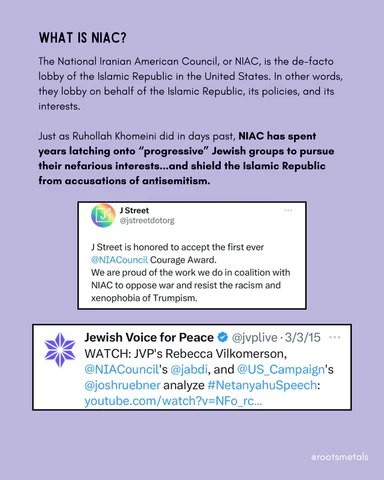
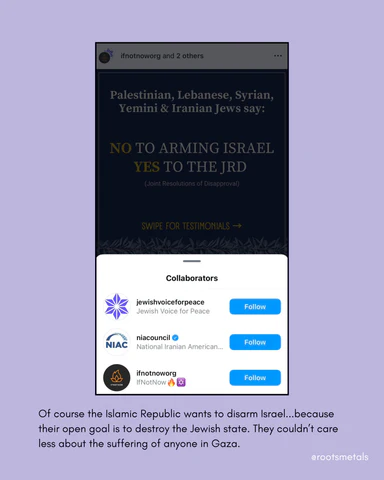
Of course the Islamic Republic wants to disarm Israel...because their open goal is to destroy the Jewish state. They couldn’t care less about the suffering of anyone in Gaza.
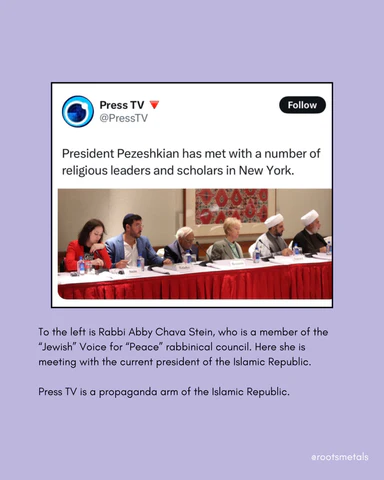
To the left is Rabbi Abby Chava Stein, who is a member of the “Jewish” Voice for “Peace” rabbinical council. Here she is meeting with the current president of the Islamic Republic.
Press TV is a propaganda arm of the Islamic Republic.
THE ISLAMIC REPUBLIC AND THE NETUREI KARTA
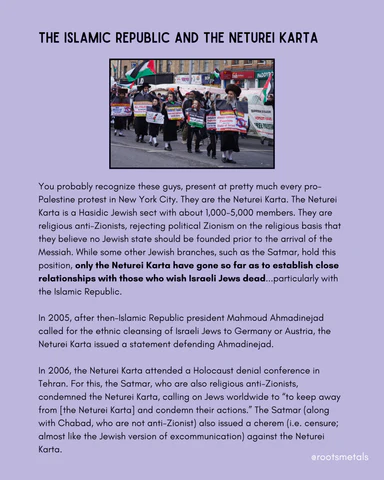
You probably recognize these guys, present at pretty much every pro-Palestine protest in New York City. They are the Neturei Karta. The Neturei Karta is a Hasidic Jewish sect with about 1,000-5,000 members. They are religious anti-Zionists, rejecting political Zionism on the religious basis that they believe no Jewish state should be founded prior to the arrival of the Messiah. While some other Jewish branches, such as the Satmar, hold this position, only the Neturei Karta have gone so far as to establish close relationships with those who wish Israeli Jews dead...particularly with the Islamic Republic.
In 2005, after then-Islamic Republic president Mahmoud Ahmadinejad called for the ethnic cleansing of Israeli Jews to Germany or Austria, the Neturei Karta issued a statement defending Ahmadinejad.
In 2006, the Neturei Karta attended a Holocaust denial conference in Tehran. For this, the Satmar, who are also religious anti-Zionists, condemned the Neturei Karta, calling on Jews worldwide to “to keep away from [the Neturei Karta] and condemn their actions.” The Satmar (along with Chabad, who are not anti-Zionist) also issued a cherem (i.e. censure; almost like the Jewish version of excommunication) against the Neturei Karta.
THE OLDEST TRICK IN THE BOOK
How do you deflect legitimate accusations of genocidal antisemitism? You “befriend” Jews, of course. As in: “how could I be antisemitic?! Look at all these Jews who support me!” Three historical examples:
(1) Leading up to the 1936 Berlin Olympics, the United States Olympic Committee was under tremendous pressure to boycott the Games, given Nazi Germany’s horrific treatment of Jews. The head of the US Olympic Committee, Avery Brundage, was a Nazi sympathizer, who convinced Germany to allow one German Jewish athlete to compete to give the impression that Jews in Germany were being treated fairly. In other words, the Nazis needed a token Jew. They proceeded to select a Jewish fencer, Helene Mayer, to the German Olympic team. Mayer placed second and gave the Nazi salute on the podium.
(2) In the 1920s, the Soviet Union shut down virtually all Jewish cultural, social, and religious institutions using a Jewish group, the Yevsektsiya, as a cover. According to historian of Soviet history Richard Pipes, “In time, every Jewish cultural and social organization came under assault.” The fact that the Yevsektsiya was “Jewish” was central to its purpose. After all, the Soviet regime couldn’t be accused of antisemitism when those shutting down all Jewish cultural and spiritual life were Jews themselves.
(3) Likewise, in the early 1950s, notorious Soviet dictator Josef Stalin conceived a plan for the mass deportation of Soviet Jewry to prison camps, all under the guise of “anti-Zionism.” Though the plan never ultimately came to pass, given Stalin’s sudden death, Stalin had made preparations to publish a letter to be signed by Soviet Jews “denouncing” Zionism and Zionist Jews. In the letter, Stalin’s “anti-Zionist Jews” would then urge the Soviet state to “take action” against the traitorous Zionist Jews. Jews would be deported en masse to the Ural Mountains, where MGB would instigate discord between Jewish leaders. Later, they would kill the “elites” in the camps, and maybe even follow with the rest of the Jewish population.
For a full bibliography of my sources, please head over to my Instagram and Patreon.
rootsmetals
I’ve had my differences with J Street over the years but seeing them shill for the Islamic Republic was disappointing tbh…I expect nothing less of JVP and IfNotNow, but I (stupidly?) thought J Street was better than that 🤷🏻♀️
41 notes
·
View notes
Text
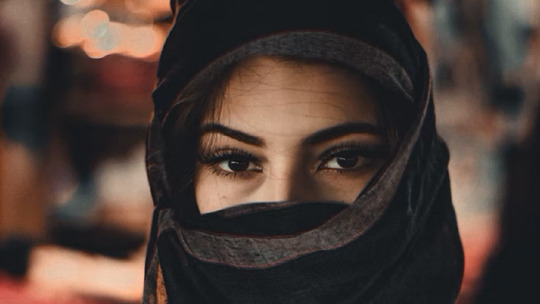
Islam for Beginners II: Hijab Confab
The Koran instructs Muslim women to be modest in their dress partly to publicly identify with Islam and partly to avoid sexual assault. Since AD 630, we have come to understand that the sexual assault of women is not caused by how sexy they look but by male control issues. Human rights groups and feminists universally advise that placing responsibility on the prospective victim is a counter-productive approach to reducing sexual assaults. The Koran seems to acknowledge this in part when it instructs men in particular to "lower their gaze and guard their chastity".
If the object of Islamic modesty is to protect women, it’s not working. Sexual harassment is prevalent in the Muslim world, even in Mecca during the Hajj. The modesty rules of Islam do nothing to stop sexual harassment of women and sometimes make things worse.
In fact, there is almost a directly proportional relationship between a country’s legal dress codes and women’s rights. While women should feel free to wear whatever they like, freedom means nothing if governments punish women for not wearing particular items for supernatural reasons.
A quick tour of Afghanistan
The black burqa is not, and never has been, a part of traditional Afghan culture. It is a recent imposition by Islamic fundamentalists on the women of Afghanistan. Of course, some women insist that they are honouring their Islamic values by following the hijab rules but the Koran says nothing at all about burqas. It only mentions the khimar (veil) and the jilbab (dress).
The Taliban’s “strict interpretation of Sharia” seeks not only to control women but to eliminate the feminine anywhere it cannot be directly controlled by a man. In 2022, the Taliban ordered women to wear the burqa or “stay at home”. Later that year, the Taliban banned women from universities.
Any explanation for the compulsory burqa which involves serving the interests of women is repudiated by the fact that the Taliban “have institutionalised oppression against women” at every level of society.
A quick tour of Iran
In 1936, the fascist government of Iran led by the Shah passed a law called Kashf-e hijab banning all Islamic veils. This was part of a larger effort to Westernise the country. Women were beaten, their headscarves and chadors torn off and their homes were forcibly searched.
In 1983, the theocratic government of Iran led by the Ayatollah made Islamic veils mandatory for all women. Women who violate the law can be jailed or fined for appearing in public without the hijab.
Two patriarchal Iranian governments managed to come to completely opposite conclusions about the hijab while uniformly removing the agency of Iranian women.
A 2020 survey, in line with previous surveys, showed that 72% of the population opposed the compulsory hijab. This figure must include some hijabis. This September, after the morality police beat a woman to death, many Iranian women from all sections of society risked their lives to protest. Demonstrations are ongoing. In response, the government has assured protestors they are “working” on whether the law needs to change.
Any explanation for the compulsory hijab which involves serving the interests of women is repudiated by the fact that the women in Iran “continue to be treated as second class citizens”.
Oppressive or empowering?
For many women who live where not wearing the hijab has serious political or social consequences, the hijab will be a symbol of oppression and violence. In these places, the correct response for those of us interested in freedom and justice is to support women who choose not to wear the hijab.
In Iran, the law mentioned above states that women “who appear in public places and roads without wearing an Islamic hijab, shall be sentenced to ten days to two months’ imprisonment or a fine of fifty thousand to five hundred Rials.”
For many women who live where wearing the hijab has serious political or social consequences, the hijab will be a symbol of defiance and empowerment. In these places, the correct response for those of us interested in freedom and justice is to support women who choose to wear the hijab.
In India, for instance, earlier this year, women were refused entry to their classrooms because they were wearing hijabs. Groups of men often harass and intimidate women in the street for how they choose to dress by chasing them and screaming Hindutva (Hindu fascism) slogans. In this video which went viral in the Muslim world, one very brave girl is reduced to screaming “Allahu Akbar” to defend herself against a Hindutva mob. There is a political context here that matters. The relationship of India with its Muslim population could be summarised as a series of massacres.
It’s otiose to pretend there’s no context to anything and if some ex-Muslim (and Muslim) women understandably hate the hijab, then it must necessarily be always stupid and dangerous or if some Muslim women embrace the hijab, then it must necessarily be always amazing and empowering. The intersection of religion and politics is never that simple.
9 notes
·
View notes
Text
“Woman, life, freedom.” How the women of Iran protest the hijab
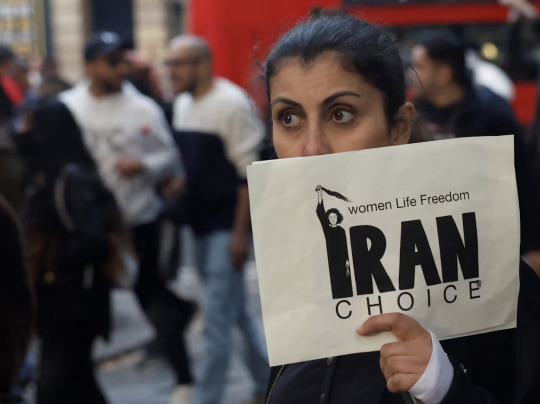
(Clodagh Kilcoyne/Reuters)
In September 2022, 22-year-old Mahsa Amini was arrested by morality police in Tehran, Iran, for refusing to wear a hijab. Hijabs have been mandatory in Iran for women since the revolution in 1979, when the Imperial State of Iran was replaced with the Islamic Republic. Only a month after the victory of the revolution, Iran's new head of state, Grand Ayatollah Ruhollah Khomeini, declared: “Sin is not allowed in Islamic Cabinet ministries. Women should not appear naked in the ministries. Women are allowed only with a hijab. There is no obstacle to them working but only if they wear the hijab as prescribed by Islamic law.”

(Aristotle Saris/AP Photo)
The following day, over 15,000 Iranian women celebrated International Women’s Day, gathering in front of the prime minister’s office in Tehran in protest against the mandatory hijab. As of 1983, Parliament has since passed the Islamic Penal Code, which establishes a punishment of “up to 74 lashes for women appearing without Islamic hijab in public.” In 1996, the law was revised and replaced with “physical punishment with incarceration and fines.”
In the case of Mahsa Amini, her suspicious death in police custody sparked massive outrage across the country, prompting widespread and large-scale protests. Videos were posted and spread online of Iranian women cutting their hair and burning their hijabs, which served as a powerful way to both protest the morality police responsible for Amini’s death and reject the policy of compulsory hijab. Iranians— both men and women, peacefully protested in the streets of Tehran, and in big and small towns across the country, chanting, “Woman, life, freedom.”
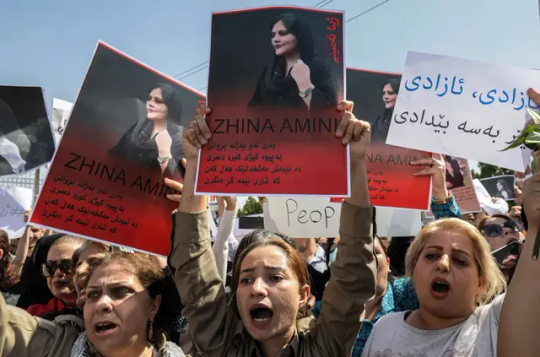
(Safin Hamed/AFP/GI)
While many of these protests have been shut down or lost traction and attention outside of Iran, political activism in the name of women's equality and freedom continues to thrive in different forms. Widely recognized imprisoned female activists continue to leak statements and voice recordings online, describing and criticizing their living conditions in prison and encouraging other activists to keep working. Discussions and online meetings continue to be held in private online forums such as Twitter, Telegram, and WhatsApp. The women of Iran continue to engage in quiet civil disobedience regardless of the risks or consequences.
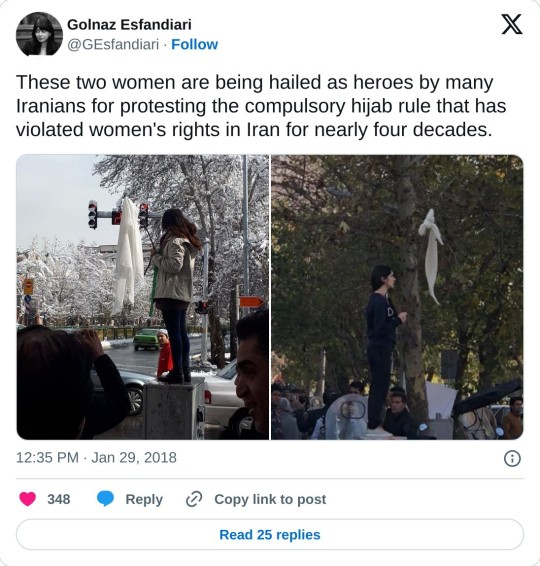
In 2017, five years before Mahsa Amini's death, a young woman named Vida Movahed climbed and stood on top of a utility box on one of Tehran's busiest streets. She stood, bareheaded—calmly waving her white scarf on a long stick. Her peaceful yet powerful display of defiance went viral, and photos soon circulated of other Iranian women taking off their headscarves in public. These acts of resistance contrast the violent treatment women like Mahsa Amini face at the hands of the Iranian government and police. They serve as an important example and reminder of the power the people can hold.
Kenyon, Peter. “Public Protests Are over but More Iranian Women Are Refusing to Wear the Hijab.” NPR, NPR, 20 June 2023, www.npr.org/2023/06/20/1183152677/public-protests-are-over-but-more-iranian-women-are-refusing-to-wear-the-hijab.
Bazoobandi, Sara, et al. “Hijab in Iran: From Religious to Political Symbol.” Carnegie Endowment, Carnegie Endowment for International Peace, 13 Oct. 2022, carnegieendowment.org/sada/88152.
Alfoneh, Ali, et al. “The End of Mandatory Hijab in Iran?” Arab Gulf States Institute in Washington, 28 Feb. 2024, agsiw.org/the-end-of-mandatory-hijab-in-iran/.
Tajali, Mona. “Women’s Activism in Iran Continues, despite Street Protests Dying down in Face of State Repression.” The Conversation, 16 Nov. 2023, theconversation.com/womens-activism-in-iran-continues-despite-street-protests-dying-down-in-face-of-state-repression-213514.
Radio, CBC. “Peace Movement: The Impact of Grassroots Activism, Policy, and Culture.” Gray Group International, Gray Group International LLC, 5 Oct. 2022, www.graygroupintl.com/blog/peace-movement.
#thepeacepigeon#hijab#nonviolence#mahsa amini#peace activism#protest#human rights#womens rights#iran revolution
39 notes
·
View notes
Text
I come from a country where being a woman is a crime. Journalism is a crime, being LGBT is a crime, being a dissident is a crime, protesting is a crime, being a human rights activist is a crime. The number of crimes and restrictions in my country are so high that there is no space for freedom. These crimes are punishable by arrest, torture, lashing, imprisonment, rape, and execution. I am here today to receive this special award because of my fight, even if this fight was not my choice, it was my duty.
At the age of 14, I was a victim of the Morality Police for the first time. I believed that it was my duty to fight against the compulsory hijab. Ever since I learned that a woman’s voice, a woman’s dance, and a woman’s body were forbidden, I have been fighting for women’s rights.
When my father was imprisoned, he was locked away for four years and whipped 74 times for protesting against the Islamic Republic. As a result, I could only see him once a week through glass, and I understood it was my duty to fight for freedom of expression.
When I witnessed people being executed for no reason, I decided to fight against the executions. Finally, when I saw that the government was taking the lives of innocent people because of street protests, I decided to fight against the Islamic Republic’s very nature. After my fifth arrest for human rights activism, it only made me more determined to continue my fight.
The clothes I wore every day to leave the house were not ordinary clothes, but war clothes, and outside the house was a battlefield. I took every opportunity to walk without the mandatory hijab in the streets and I was sharing my pictures on social media. It didn’t take long for them to come for me. When I went to the morality police building, I was also 22 years old, and I was interrogated in the same building where Mahsa Amini, a 22-year-old Iranian girl, was murdered sometime later.
Before entering that building, I made a video of myself with my scarf over my shoulder and shared it on my social media pages. I announced that I was not afraid of being arrested or being threatened, and I was saying ‘No’ to the compulsory hijab and the Islamic Republic. My father, who was with me and supporting me, was beaten in front of my eyes. We were both arrested, and he was sentenced to 74 lashes, while I was sentenced to jail and fined.
The judge said that the hijab is a mandatory law and that you have to respect it. I replied that slavery was also a law at one time. As a woman and a citizen of this country, I not only disregarded this false law, but I strived to destroy it. The last time I came out of prison, I was expelled from university, I was not allowed to work, we were banned from leaving the country and I was sentenced to six years in prison. They wanted to put so much pressure on me that I would surrender and not be able to live. But I was fighting to live and be free.
I was not permitted to leave the country and I decided to illegally escape from Iran. In the last moments, the border guards opened fire on me several times. For the last time, I looked at my homeland. From the top of the mountain. I had to leave my motherland, which I loved so much. There I decided to fight for all those who chose to live the life of an exile until the day when their country is a safe place to live. The day when being a woman is no longer a crime in this country. The day when the answer to protest will not be a bullet and no one should be imprisoned for his opinion and no one should be sentenced to death for protesting.
Today, it has been 513 days since my father was disappeared, like so many other Iranians who are seeking freedom. I realized that I had to fight harder and harder for the life that has been stolen from me, my family and the people of my country, by the Islamic Republic. As I am speaking to you today, many Iranians are fighting in the streets, and it is a daily exercise to achieve freedom, and they know that freedom is the only way to be saved.
In the protests that followed Mahsa Amini’s murder, at least 530 people were killed, including 64 children, and at least 500 people were shot in the eye. Tens of thousands of protesters have been arrested and more than 100 are facing the death penalty, four of whom have been executed so far.
Their names were:
Mohsen Shekhari
Majidreza Rahnroud
Mohammad Mehdi Karmi
Mohammad Hosseini
All of them were under forty years old, and all were professional workers and athletes.
The Iranian people are deprived of their most basic rights and have no choice but to fight back. Our revolution has not stopped. These days, despite all the repression, Iranian women go to war against the Ayatollahs with their hair as a weapon. We are on the road to a glorious revolution of Women, Life, and Freedom. The protests and repression have also affected Iranian universities and schools. It is a huge crime that the government is attacking the girls’ schools with chemical gas to take revenge on the women. Many female students are taken to hospital because of the poisoning.
I am speaking to governments, institutions, and free-minded people around the world. Today, when the Islamic Republic is in its most vulnerable position, support the brave men and women of Iran. Treat the criminal government of the Islamic Republic as an occupier and list the Islamic Revolutionary Guard, whose duty is to protect the government and kill people, as a terrorist organization. Because my country is being occupied by one of the most ruthless dictators in history and my people have been taken hostage. Taking hostages has become a tool to silence the opposition and win concessions from Western governments.
I thank you for honoring me with this award. I dedicate it to my brave companions, especially the Iranian women, who are fighting daily against a government that is aggressively anti-women, anti-life, and anti-freedom. They won’t give up until they achieve their goal, and their resilience is an inspiration to the world that is watching.
The victory is ours.
Woman, Life, Freedom.
36 notes
·
View notes
Text
In Mehran Tamadon’s new films, Iranians remember their torture
“Where God Is Not” and “My Worst Enemy” underline the hypocrisy of the theocracy
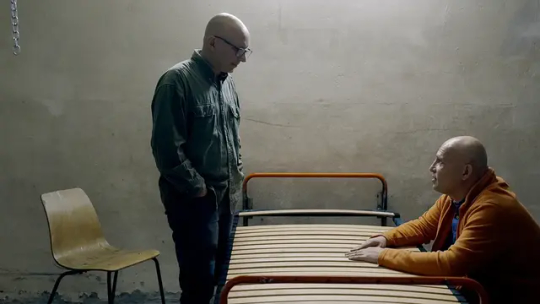
image: andana films
One weekend in 2012, an atheist film-maker discussed secularism and the compulsory wearing of the hijab (headscarf), among other topics, with four Iranian mullahs. Mehran Tamadon, the film-maker, recorded the whole thing, hoping to initiate a dialogue with the supporters of the Islamic Republic of Iran. The resulting documentary, “Iranian”, had the opposite effect. Iranian intelligence agents confiscated Mr Tamadon’s passport in 2012 and, on returning it, told him to leave the country. He has not returned since.
His story has become depressingly familiar in Iran, where censors ban any work considered critical of the theocracy. Dissenting directors are subject to travel restrictions, interrogations and imprisonment. Despite all this, cinema continues to be an outlet for resistance against the regime. After a long hiatus, Mr Tamadon has resumed his “social experiments”, this time turning his lens on the barbaric techniques deployed in Iran’s prisons. His two new films, “Where God Is Not” (pictured, above) and “My Worst Enemy”, have their premiere in Britain at Sheffield DocFest this month.
One weekend in 2012, an atheist film-maker discussed secularism and the compulsory wearing of the hijab (headscarf), among other topics, with four Iranian mullahs. Mehran Tamadon, the film-maker, recorded the whole thing, hoping to initiate a dialogue with the supporters of the Islamic Republic of Iran. The resulting documentary, “Iranian”, had the opposite effect. Iranian intelligence agents confiscated Mr Tamadon’s passport in 2012 and, on returning it, told him to leave the country. He has not returned since.
His story has become depressingly familiar in Iran, where censors ban any work considered critical of the theocracy. Dissenting directors are subject to travel restrictions, interrogations and imprisonment. Despite all this, cinema continues to be an outlet for resistance against the regime. After a long hiatus, Mr Tamadon has resumed his “social experiments”, this time turning his lens on the barbaric techniques deployed in Iran’s prisons. His two new films, “Where God Is Not” (pictured, above) and “My Worst Enemy”, have their premiere in Britain at Sheffield DocFest this month.
In “Where God Is Not” three exiled Iranians re-enact their experiences of solitary confinement and torture in jail, including the notorious Evin prison in Tehran where thousands of political prisoners are detained. Mr Tamadon’s subjects are Mazyar Ebrahimi, a businessman who was accused of being a spy; Homa Kalhori, who wrote about the devastating torture she endured in the 1980s in her memoir “A Coffin for the Living”; and Taghi Rahmani, a journalist who has spent over 14 years in prison.
Each describes the horrors that their captors inflicted on them. The former prisoners remember the size of their solitary cells in paces. Mr Ebrahimi recollects how his tormentors played ping-pong after beating him in a makeshift torture chamber. To his persecutors, he implies, it was all a game. “Where God Is Not” is hard to watch, but that is the point, says Mr Tamadon in the film. He wants the abusers to confront their inhumanity when they see the documentary. They are however, unlikely to have the chance—and the film’s subjects dispute the idea that brainwashing can be countered so easily. “Stop patting yourself on the back!” Mr Rahmani tells the director.
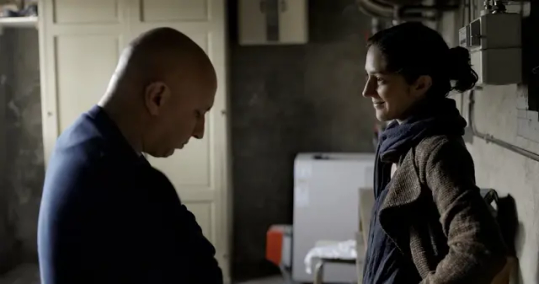
image: andana films
In “My Worst Enemy” (see above), Mr Tamadon ends up agreeing with the naysayers. The film itself rebuts the claim that cinema can “make the interrogator doubt himself”, as the director puts it. Zar Amir Ebrahimi, a prominent Iranian actor who is also in exile (and is not related to Mazyar Ebrahimi), stages a mock interrogation of Mr Tamadon. She forces him to strip, hoses him down with icy water and makes him stand for hours. She lampoons the notion that you can conduct a meaningful conversation with a “killer holding all the power”. In any case, she asks him, in making these films,isn’t he profiting from others’ suffering? Mr Tamadon may not altogether have lost his faith in cinema’s ability to inspire change, but it is evidently wavering.
Nonetheless the visceral depiction of torture and interrogation in both films reflects a bold shift in Iranian cinema. After decades of employing subtle references to evade censors, auteurs are showing violence even though it invites allegations of “siah namayi”, or “painting black” Iran’s image. For example, in “Holy Spider” (2022), a religious extremist murders sex workers; “Law of Tehran” (2019) is a gory crime thriller. This defiance reflects the mood in Iran, where anti-government protests have continued since the death in custody last September of Mahsa Amini.
“My Worst Enemy” succeeds in capturing the process by which the abused can become the abuser. In the film, Ms Ebrahimi expresses her shock at the excitement she feels as Mr Tamadon’s interrogator. She attributes her vicious feelings to her own repeated questioning by security forces: having been denied power, she now wields it. The film insinuates that the depredations of a totalitarian regime can unleash an individual’s potential to commit heinous acts. This echoes Mr Rahmani’s warning in “Where God Is Not”: “Man is a wolf to fellow man,” he tells Mr Tamadon. “Don’t become that wolf.” ■
“Where God Is Not” and “My Worst Enemy” have their premiere in Britain at Sheffield DocFest between June 14th and 18th
#Mehran Tamadon#Mahsa Amini#Where God Is Not#My Worst Enemy#Amir Ebrahimi#andana films#Iran#Cinema#hijab#The Economist
4 notes
·
View notes
Text
youtube
Masih Alinejad makes a special address at the Middle East Forum 2025 Policy Conference in Washington DC. Her bio from the MEF website:
Masih Alinejad, an Iranian-American journalist and women’s rights activist, began her career in Tehran in 2001. She launched the “My Stealthy Freedom” campaign in 2014, opposing Iran’s compulsory hijab laws and sparking the country’s largest civil disobedience movement. Due to threats from the Iranian regime, she now lives under FBI protection in the U.S. In 2023, she was named a Time Woman of the Year and became president of the World Liberty Congress, where she continues to champion democracy and women’s rights globally.
Transcript of the address can be read below the cut.
Why do all American Presidents are so desperate to get a deal with one of — not one of, the biggest sponsor of terror: the Islamic Republic? Some people say diplomacy involves talking to your enemies. I get that. But why repeating the bad deal, over and over and over? Believe me, a deal that empowers the Islamic Republic, the biggest sponsor of terrorism, is a bad deal.
When I first came to America, I was puzzled by a phrase: what happens in Vegas, stays in Vegas. I am telling you that what happens in the Middle East does not stay in the Middle East. The Islamic Republic is one of the most deadlier virus. The Islamic Republic is a cancer. And that is why if we do not get united to end this cancer, believe me, this cancer will end us everywhere.
But there are people here, they say, "America first." How should I convince them? Let me tell you something. For the Islamic Republic, America is first, too. The first thing that they want to do? To destroy America. The first thing that they teach us from the age of seven is to shout "death to America!"
Not all wars are fought with guns and bullets. There is a war of ideologies, war of narratives. They are brainwashing your children. They are brainwashing the youth at university campus. The future leaders are being brainwashed to hate America. And I keep hearing that. When the youth are saying that, "I am Hamas," it breaks my heart. When the youth say that Osama bin Laden is their hero, because suddenly they found a letter from Osama bin Laden to President of United States of America. It went viral on social media and now they are calling Osama bin Laden this hero. And later they will call Ali Khamenei a hero. That is the tactic of the Islamic Republic.
So for those who say "America first," believe me, the first target for the Islamic Republic is destruction of American values. And when we the people of Iran, especially the women, are fighting against Islamic Republic, we're trying to protect America as well. We are trying to protect democracy.
When it comes to national security, to supporting your fellow citizens, you all get united. But do you think that the American policy makers are as united as Americans when it comes to end terrorism? No. Three Presidents try to get a deal from Islamic Republic. First, President Obama send secret letters to Ali Khamenei, right after when people took to the street, the green movement happened. The secret letters empowered the Islamic Republic. He was trying to get a nuclear deal.
Next, President Biden, who actually called me a hero after surviving assassination plots, sent me a letter — but at the same time handed billions of dollars to the same hostage takers, to the same kidnappers, to the same killers, eased sanctions, and chased another deal with the Islamic Republic.
And now here we are. President Trump, who once said that "the Islamic Republic has never won a war, but it has never lost a negotiation." President Trump is also negotiating with the same regime to get a nuclear deal. From what we know the talks are limited only to nuclear issues, ignoring human rights, ignoring acts of terrorism, and only focus on nuclear issue.
Ordinary Iranians do not care about the nuclear issue at all. The only people that really care about nuclear is the people in DC. Ordinary Iranians like me, let me confess that I myself, I once believed in reforming this regime, like millions of Iranians, and we tried that. We participated in different elections — which now we call it "selections" — and now we want to bury this regime.
Millions of Iranians, believe me, when you talk to them, they say "this is the regime that they execute people for simply protesting. This is the regime that they kill teenagers, they kill women for showing their hair." I have a lot of hair. Why I don't — I get killed for showing my hair. Massive hair. I can get killed multiple times because I have too much hair. But this is the regime in 21st century punish you for your hair, and you want to negotiate with this regime.
So none of the people that I talk in Iran believe that this regime can be reformed. It seems the only people that want to still believe that this regime can be reformed are the Presidents of the United States of America. Yes.
So — my hair is good, or is it a mess? (laughs)
Finally, how we help Iranians. That's a question a lot of people ask. So I am here to tell you, we don't want Americans to save us. Just try not to save the Islamic Republic. Yes! Anytime, anytime when people of Iran manage to shake the regime — and honestly, people take to the street and shake the regime — then the Presidents of the United States of America try to shake the hands of the same regime.
So, second: where is the maximum pressure? We heard that a lot, no? No, honestly, negotiating with the Islamic Republic, with the terrorist regime, is not maximum pressure. It is legitimizing one of the most barbaric regime. Yes, and I am shocked. In 1970s the US Congress passed the Jackson-Vanik Act, limiting any deal with the Soviet Union to its human (rights) record. We need the same thing, right now, to limit any deal and any negotiation with the Islamic Republic. It is shocking that no one talks about human rights. We keep hearing that the US officials always say that "we stand with the people of Iran." We literally want you to sit down with the people of Iran, the same way that you sit down with killers.
So the third is to get people of Iran, to get the opposition, to get pro-democracy fighters involved in negotiation as well. We need to go beyond the idea of #diplomacy. Enough of condemning executions, human rights abuse, on social media.
And most important than this: I strongly believe that democratic countries must embrace the idea of regime change. I know some Americans, they are allergic to regime change. I'm only allergic to dictators! And that's the logic: we should all be allergic to dictators. Because whether you want or not, we want to change this regime. Because we strongly believe that. We strongly believe that eliminating Hamas was a blessing for the Middle East. Eliminating Hezbollah's leader was a blessing for the Middle East. Eliminating Qasem Soleimani — people were celebrating, in Iran and across the Middle East. The only people that were mourning for the death of these terrorists, bunch of terrorists, were people, again, in the West. Calling them "negotiators of peace." Calling them the "national heroes of the Middle East." And I am here to tell you: eliminating terrorists is not tragedy, it is a sign of justice. And if you think that I am promoting violence by saying that, think about the time when Osama bin Laden was eliminated. What happened in America? People were seeing that as a sign of justice for the victims of September 11, no? So what is different between people of America and people of Iran? We have to see the same justice.
The Islamic Republic is in its weakest point in the history. Hezbollah smashed, Hamas crushed, Bashar Assad gone. For years and years, the Islamic Republic officials, and their lobbies in the Middle East, were warning us that if we get rid of the Islamic Republic, Iran is going to be another Syria. Chaotic. Bashar Assad is gone! What is happening in Syria? I know it's early days but my people, my friends from Syria, are planning to go back home. Hugging their families.
No regime is more chaotic than the Islamic Republic. Ali Khamenei is not going to last forever. But, believe me, the West is not ready for his death. So, getting rid of Islamic Republic will benefit the rest of the world. And believe me, a Middle East without Islamic Republic will guarantee global security. So don't be allergic to regime change, be allergic to dictators, and stand with the people of Iran in their fight against tyranny.
Thank you so much. I appreciate it. Thank you.
1 note
·
View note
Text
As Shadi prepares to become a mother for the first time, the Iranian 30-year-old is so concerned about her unborn daughter’s future that she is considering leaving her homeland.
“The challenges and inequality we face as women start from birth,” said Shadi, a housewife in Tehran, who did not give her full name for fear of persecution. “The hijab is imposed on girls from a young age, restricting their freedom in society and affecting how they grow up as well as their opportunities in life,” she added.
Iran has imposed a strict dress code on women since a revolution swept the ruling Islamic regime into power 45 years ago, obliging them to cover their hair and wear loose-fitting clothes. Authorities have stepped up enforcement of the rules since the death of Mahsa Amini in police custody in September 2022 triggered major protests across the country, during which women openly flouted the code. Last year, Iran’s parliament approved a bill to strengthen punishments for such violations.
Although the protests have subsided, the hijab has been a prominent issue ahead of the elections that will occur on the first day of March for Iran’s parliament and the executive council that appoints the country’s supreme leader. Turnout is expected to be low, with young voters particularly disillusioned with the political process—a trend that contributed to the 2022 protests. A recent poll found that only 30 percent of Iranians intend to vote, according to the semiofficial Iranian Students’ News Agency. Many are also voting with their feet and migrating to other countries.
Shadi said that she worried about her daughter growing up in an “environment that denies her her most basic rights,” adding, “I want to move as soon as possible to a country where basic freedoms are more readily available.”
Such freedoms are increasingly under threat for Iran’s female citizens, according to women’s rights advocates and United Nations experts, who say the hijab crackdown is creating a chilling effect on women’s rights activism and legitimizing broader gender discrimination.
According to several women interviewed by the Fuller Project, this means that Iranian women now cannot drive, do their jobs, or even have a coffee without worrying about having their cars impounded, being fired, or getting hit with fines if the hijab is not worn—or worn too loosely. “This crackdown on women’s dress code will further degrade women’s rights to work, study, drive, and participate fully in public life,” said Rothna Begum, a senior women’s rights researcher at Human Rights Watch.
The hijab bill was passed in September and is still awaiting its expected approval by the Guardian Council—Iran’s hard-line watchdog body—before it can become law. It would increase fines, introduce jail sentences of up to 10 years for women who defy dress rules, and widen gender segregation in places ranging from universities and hospitals to parks. U.N. experts have said it could amount to “gender apartheid.”
“The Iranian authorities have been doubling down their oppressive methods of policing and are punishing women and girls to quell widespread defiance of degrading and discriminatory compulsory veiling laws since the popular ‘Woman, Life, Freedom’ uprising,” said Mansoureh Mills, an Iran researcher for Amnesty International.
Amini’s death, which occured under police custody after she was arrested for allegedly wearing her hijab too loosely, triggered some of the worst political unrest seen in Iran in decades. While the protests have ebbed, women continue to defy the dress code by posting photos online of themselves unveiled or going out in public without the headscarf.
Anahid, a 21-year-old performing arts student, said she was pulled over in December by police in Tehran while driving and told that her car was being impounded because she had violated the dress regulations. Anahid—whose name has been changed for her protection—said she spent five days dealing with various government offices over the issue and had to pay fines totaling more than $110 to reclaim her vehicle.
“Driving in the streets of the capital has become perilous … but I will not allow such intimidation to alter my driving or clothing,” Anahid said, recounting how some of her female friends had experienced similar incidents.
Whether women do not wear the hijab properly while behind the wheel, at the workplace or simply sitting at a cafe, penalties for noncompliance can be severe. Women convicted of violating veiling laws have been subjected to “degrading punishments,” including being forced to wash dead bodies for Islamic burials and clean government buildings, according to a report published in August 2023 by Javaid Rehman, the U.N. special rapporteur on human rights in Iran.
But it’s not just women who are falling foul of the dress code and being penalized. Ali, a 40-year-old man who owns a cafe on Tehran’s Keshavarz Boulevard, said his business had been shut down twice by authorities because his female customers were not wearing the hijab properly. Authorities have temporarily closed thousands of businesses, from shops to offices, since Amini’s death—because either female employees or customers were seen without the hijab, according to various media reports.
Under the Hijab and Chastity Bill, businesses that flout the law could be fined up to three months of their income. But Ali—who asked that his real name be withheld for security concerns—said he supported the protest movement and that he would not ask women visiting his cafe to cover their hair. “I won’t do it, no matter the losses,” said Ali, who said he expected more raids on his business and further closures over dress code violations. “It’s a normal price to be paid for change to happen in the country.”
Hard-line clerics, top judges, and President Ebrahim Raisi have repeatedly issued warnings in recent months to women who violate the dress code, according to Iran International, a London-based television station that is critical of the Iranian government. At a public event in August, Raisi said, “I am telling you that the removal of the hijab will definitely come to an end.”
Iran is regularly ranked as one of the worst countries to be a woman in terms of gender parity for economic opportunities, education, health concerns, and political leadership, according to research by the World Bank and the World Economic Forum (WEF). Although more women graduate from university than men, Iran has one of the lowest rates of female employment and biggest gender pay gaps worldwide, the WEF’s latest Gender Gap Report shows.
Masoumeh Bagheri, a member of a state-appointed team to empower women who are heads of households in Tehran province, said there is still an entrenched belief in Iran that women belong in the home, and added that their role in society is widely seen as “secondary, complementary, and sometimes unnecessary.”
Such attitudes have left Samira Akbari, a jobless, 25-year-old computer science graduate in Tehran, pessimistic about her career prospects. Akbari—who also asked that her real name be withheld—said she was delighted when she landed her first permanent job for an online store in July 2023 after years of taking short-term contracts to build up her resume. But she was fired after just three weeks and replaced by a male intern.
Akbari said she did not know if hijab regulations played a part in her dismissal, but that her boss had explained that her male colleagues were uncomfortable with her presence.
“I would’ve understood if I was performing poorly, but instead, it’s my teammates not being comfortable around women that got me sacked,” said Akbari, who has since been unemployed.
24 notes
·
View notes
Text
Iran Urged to Free Woman Detained for Undressing at University
(Tehran) – Human rights advocates have called for the release of a woman in Iran who was detained after removing her clothes at a university, reportedly in protest against Iran’s compulsory hijab laws. A video circulated on social media on Saturday, capturing a woman sitting in her underwear on the steps of the Science and Research Branch of Islamic Azad University in Tehran. She is later seen…
0 notes
Text
Iran urged to release woman detained after undressing at university
Human rights activists have called on authorities in Iran to release a woman who was detained after removing her clothes at a university, in what they said was a protest against the compulsory hijab laws. A video surfaced on social media on Saturday showing the woman in her underwear sitting on some steps and then walking calmly along a pavement at the Science and Research Branch of Islamic Azad…
0 notes
Link
Cartoon titled “Women’s Dance of Freedom” by Shahrokh Heidari @shahrokhart, November 2023. Fire and fury against compulsory hijab continue to ignite in Iran.
0 notes
Text
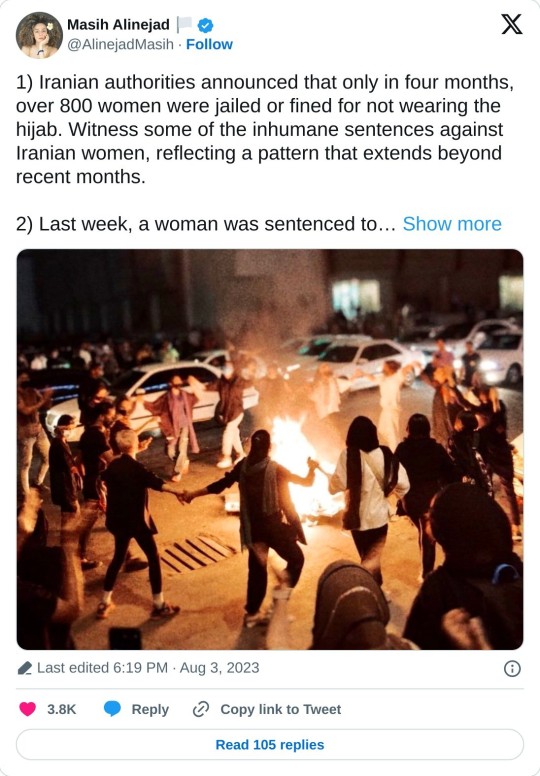
"1) Iranian authorities announced that only in four months, over 800 women were jailed or fined for not wearing the hijab. Witness some of the inhumane sentences against Iranian women, reflecting a pattern that extends beyond recent months.
2) Last week, a woman was sentenced to wash corpses for a month as public service in Tehran for removing her hijab in a car.
3) Afsaneh Bayegan, a film and TV actress, was sentenced to attend psychological centers for protesting compulsory hijab. She must seek treatment for a "mental illness" and prove her mental health at the end.
4) Sepideh Rashno, a writer and editor, was arrested after a clash over compulsory hijab. Her suspension order requires her to write a 110-page research paper on literature and harm to public opinion.
5) Yalda Moayeri, a news photographer, was sentenced to two months of mortuary work for photographing protests in Iran. She proudly stated she'll undertake the work where photographing people's protests is forbidden.
6) The Islamic Republic is furious with women for defying Islamic Sharia laws, harassing them daily. Despite this, women continue to fight against the Islamic Republic's gender apartheid every day.
#WomanLifeFreedom"
19 notes
·
View notes
Text
The regime was appointed in May by the president of the UN Human Rights Council.
EU foreign affairs chief Josep Borrell defended Iran’s appointment as a matter of regional rotation, “in consistency with established UN procedures.”
But UN Watch research shows in fact that the Asian group, to which Iran belongs, has held the position four times in the past six years, denying rotations to several other regional groups.
Iran’s appointment can be overturned by a special meeting of the council before Thursday, said Hillel Neuer, executive director of UN Watch, an independent non-governmental human rights organization based in Geneva, which has drafted a resolution for countries to adopt.
UN Watch has been a leading voice at the United Nations on human rights in Iran.
UN Watch’s campaign is backed by a global petition signed by more than 90,00 people, calling on the UN to overturn Iran’s chairmanship of the UN human rights forum.
The group today launched a social media campaign, and a video of Neuer’s recent appearance before the UN human rights council, where he challenged Iran’s appointment, is going viral with more than 600,000 views since its release this afternoon.
“We are calling on Mr. Borrell to take action. It’s time for all democracies at the UN to stop legitimizing murderous regimes, in violation of the world body’s founding principles, and instead to begin holding the perpetrators to account,” said Neuer.
“The murderous regime in Tehran is responsible for a surge in executions, disproportionately applied to minorities, and for oppressing women and girls. The recent death of 16-year-old Armita Geravand, after being assaulted on the subway by the Iranian morality police for not wearing the compulsory hijab, is a reminder that this is a cruel regime that does not belong on any UN human rights body, let alone as chair.”
“It is unimaginable that on Thursday at the UN human rights council, Ayatollah Khamenei’s representative will be holding the gavel, with UN human rights chief Volcker Turk and other dignitaries at his side,” said Neuer.
“These appointments send the wrong message at the wrong time, enabling the Islamic Republic of Iran — even as it is shooting protesters in the face, raping human rights defenders in prison, and sponsoring Hamas atrocities — to strut on the international stage as a respected and influential actor.”
“No less, the regime is able to proclaim victory to its people — witness the instant declarations in state-controlled Mehr News Agency and Islamic Republic News Agency — in order to dishearten, dispirit and demoralize dissidents,” said Neuer.
“Iran’s regime never should have been chosen. Sadly, inside the UN, too many country delegations seek to go along to get along. In their closed world of backroom deals, a bloody dictatorship is every inch the equal of a liberal democracy. Democracies that pay lip service to the high principles of the UN Charter too often ignore them when making critical UN decisions.”
0 notes
Text
Australia has slapped a fresh wave of sanctions on Iranian officials, including the Middle East country’s so-called morality police, cyber officers and broadcasters for the efforts to quell dissent against the hardline Islamic regime.
Foreign Minister Penny Wong unveiled the sanctions on Wednesday to mark the first anniversary of the arrest of Iranian woman Mahsa Jina Amini, 22, by Iran’s morality police for failing to wear a hijab in Tehran.
Ms Amini’s death in custody three days later – her family and local journalists claims she was bashed by police, rubbishing authorities’ claim she had a sudden heart attack – transformed her into a symbol of the repression of females by the theocracy and sparked widespread protests in one of the biggest challenges to clerical rule since the 1979 revolution.
The morality police nevertheless resumed arresting women for failing to comply with its mandatory dress code in July, with authorities on edge for fresh protests in the run up to the anniversary of Amini’s death on September 16.
Senator Wong said four Iranian officials and three organisations would have travel bans and financial sanctions imposed on them, joining 27 people linked to the Islamic Revolutionary Guard Corp who had already been singled out by Canberra.
The officials are police spokesman Saeed Montazer Al-Mahdi, who has threatened women with arrest for breaching the compulsory veiling laws; Islamic Republic of Iran Broadcasting (IRIB) reporters Ameneh Sadat Zabihpour Ahmadi and Ali Rezvani, who have played key roles in broadcasting coerced confessions of dual nationals, civil society activists, political prisoners, writers and religious minorities; and the head of Iran’s Cyber Police, Vahid Mohammad Naser Majid, who has overseen the suppression of protests by instigating internet blackouts, including disabling WhatsApp and Instagram, and banning the use of Google Play and VPNs.
The organisations sanctioned are the cyber police, IRIB’s satellite news channel Press TV and ArvanCloud, an Iranian web-hosting provider used to block traffic and spy on dissidents.
“Australia stands in solidarity with the people of Iran, especially the courageous women and girls who continue to demonstrate immense bravery in the face of ongoing repression.”
Opposition assistant spokeswoman for foreign affairs Claire Chandler urged the Albanese government to do more to hold the Iranian regime to account.
In addition to its oppression of and violence against females and critics, Senator Chandler said accounts of Australians being intimidated, targeted and harassed locally by agents of the regime were deeply troubling.
“Despite its abhorrent behaviour, the Islamic Republic of Iran regime is expanding its global diplomatic influence, providing weaponry to Russia, continuing to gain positions of influence at the UN, and continuing to profit from hostage diplomacy and breaching sanctions,” she said.
0 notes